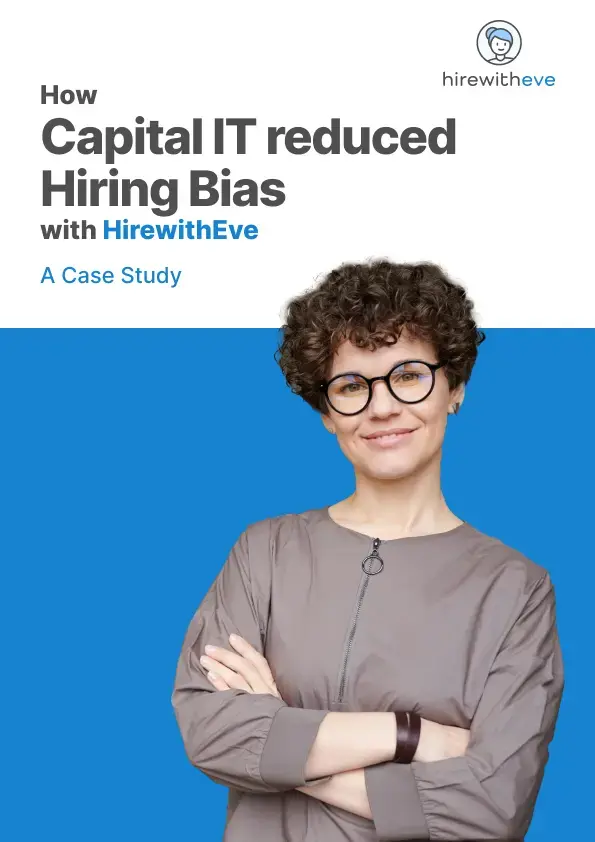Mastering Informational Interviews for Talent Acquisition

Mastering Informational Interviews for Talent Acquisition

In the realm of talent acquisition, mastering the art of conducting interviews is crucial for finding the right fit for your organization. Informational interview questions play a vital role in this process, allowing you to gather comprehensive insights into a candidate's skills, experiences, and career aspirations before delving into more challenging situational or technical questions. This strategy not only helps candidates feel at ease but also enhances the overall candidate experience, which is essential in today's competitive job market.
In this comprehensive guide, we’ll explore the best informational interview questions you can ask applicants, provide tips on evaluating their responses, and demonstrate how HirewithEve can revolutionize your talent assessment process.
Table of contents
Introduction: The Importance of Informational Interviews
Top 25 Informational Interview Questions to Get to Know Your Applicants
10 Additional Informational Interview Questions You Can Ask Applicants
Assessing Candidate’s Past Experience and Future Goals
Why HirewithEve is the Right Fit for Your Talent Assessment Needs
Conclusion
Introduction: The Importance of Informational Interviews
Informational interview questions are essential tools in the hiring process. They allow you to gather detailed insights into a candidate's background, motivations, and future goals. By starting with these questions, you create a more relaxed atmosphere, encouraging candidates to open up and share information that goes beyond their resumes. This initial stage sets the tone for the rest of the interview, paving the way for more in-depth discussions.
The Role of Informational Interview Questions
Informational questions serve multiple purposes. They help you:
Understand a candidate's career trajectory and motivations.
Gauge their enthusiasm and commitment to the field.
Identify their values and how they align with your company culture.
Assess their problem-solving skills and adaptability.
Enhancing the Candidate Experience
Creating a positive candidate experience is crucial in attracting top talent. Informational questions help ease candidates into the interview process, reducing anxiety and building rapport. A relaxed candidate is more likely to provide honest and insightful answers, giving you a clearer picture of their fit for the role and the organization.
Top 25 Informational Interview Questions to Get to Know Your Applicants
Using the right informational interview questions can make a significant difference in the quality of insights you gain. Here are the top 25 questions to consider:
How and why did you start your career in this industry?
Listen for genuine and personal stories that connect the candidate’s interests and skills with the field. It's important to spot passion and a clear goal. A great answer will not only mention how they started but also why they chose this specific path, revealing their long-term commitment and enthusiasm for the field.
What do you find most rewarding about working in this field?
This question is a window into what the candidate values most in their work. Good answers will reveal not only satisfaction but also alignment with the goals of the company. Whether they enjoy the collaborative environment, the challenges of the industry, or the impact of their work, candidates should provide clear examples that demonstrate their passion and how it translates into good performance.
What's your least favorite aspect of your role?
Nobody loves every part of their job; this question helps gauge how candidates handle tasks they don’t enjoy. Look for responses that show a constructive attitude towards necessary but boring or tedious assignments. It’s a positive sign if they talk about strategies or mindsets they’ve built to handle these aspects effectively, showing adaptability and a proactive approach to work.
What are the biggest challenges you face in your current position?
Challenges are always part of the puzzle, and how a candidate deals with them can tell you a lot about them. Probe for detailed stories to evaluate the candidate's problem-solving skills. Top applicants will explain how these challenges fuel their personal and professional growth, showing their ability to learn and adapt.
What are the most important factors for success in a role like yours?
This is a great opportunity for candidates to reflect on what makes them successful in their roles. Look for answers that include hard skills, such as technical expertise or proficiency with specific software tools, and soft skills, like communication and teamwork. Candidates who can link these skills to specific results are the ones who know what’s required to excel.
Can you describe a typical day at your job?
Information on a candidate’s daily routine offers insights into their organizational and time management skills. Candidates should describe how they manage their tasks, work with other team members, and handle unexpected challenges. A great answer will paint a picture of a well-organized person who knows how to keep things running smoothly and is also a great team player.
How does your current role impact your company’s success?
With this question, you can check whether the candidate sees beyond their immediate tasks to the broader impact of their work. Do they understand how their role contributes to the team and the company’s objectives? Can they tell you about situations where their efforts made a difference? Do they have a clear sense of purpose in their role?
What accomplishment are you most proud of, and why?
Look for candidates who can talk not only about their achievements but also about the impact they have had on the team and the company. Top candidates will also talk about the journey and the challenges they overcame, showing their determination, skill, and ability to solve difficult problems. What did they learn in the process? Does this accomplishment align with their career goals or personal values? Why are they proud of this particular achievement?
What advice would you give to someone starting in this industry?
Gauge the depth of the candidate’s industry knowledge and their empathy towards those who are just starting. The best answers will include practical tips and a reflection on the industry’s challenges and opportunities. This question can also reveal the candidate’s potential as a mentor or leader within your organization.
How do you keep your skills up-to-date? What’s your approach to continuous learning?
Most industries are evolving fast, so candidates must be committed to lifelong learning. Look for mentions of specific strategies they use to upskill and reskill, such as attending workshops, taking part in online courses, or going to events and conferences. An enthusiastic learner is an asset to any team, especially if you have the right learning and development program in place to support their growth.
Are there any certifications or additional training you have gotten recently?
Certifications aren’t everything, but this question can help you assess a candidate's commitment to professional development. Why did they choose those particular certifications? How are they using their newly obtained skills? How do they plan to leverage them in the future?
What do you wish you had known before entering this field?
Responses to this question enable you to assess a candidate's maturity, emotional intelligence, and capacity for growth. Look for honest and insightful reflections, specific details about skills they wished they had, and their ambition to seek new opportunities. This can also give you ideas of areas where your company might support new hires better.
What are the values that are the most important to you in a workplace?
This question helps you see if the candidate's core values align with your company culture. They might mention integrity, teamwork, innovation, or accountability; regardless of the specific answers they give, ask them for examples of how these values have influenced their work and decisions.
What new technologies have you implemented in your workflows in the past year?
This question evaluates a candidate’s adaptability and familiarity with industry-relevant technologies. Beyond the specific tools they mention, look for the reasons behind their choices. Skilled candidates will explain how each new software or framework has helped them work better, make fewer mistakes, or make tedious tasks easier. They might also touch on any challenges they faced initially and how they overcame them.
What important trends have you observed in our industry in the past year?
Following current trends shows that a candidate feels engaged with your industry and is proactive about staying informed. Look for answers that go into the details of how these trends could impact your company and the industry at large. Can candidates explain how they adapt to such new developments? Are they excited or fearful about them? Are they able to think about them analytically? This is an excellent question to evaluate candidate's critical thinking skills and their motivation to stay on top of their game.
What projects are you currently working on?
Good answers will go into the specifics of each project, the candidate’s role in them, and the skills they’re using. Plus, how they speak about their current projects will show you whether they’re passionate about their work and help you gauge their ability to manage tasks and prioritize effectively.
What motivates you in your job?
Motivation is key for any role. Candidates should be able to clearly explain what drives them to perform at their best. Is it the company’s mission they’re passionate about? Are they excited to contribute to the team’s efforts?
Have you worked in other industries? If so, how do they compare?
Of course, not all candidates will have experience in different fields, but those who do can be a valuable addition to your team. Listen for insights into how experiences in other industries have shaped their professional skill set and perspective.
What was the most challenging project you've worked on?
Candidates who are resilient and like solving problems are the ones you should be looking for, regardless of the specific project they talk about. How did they approach the challenges of this specific project? What roadblocks did they overcome? How did they handle pressure from their managers?
Are there any professional organizations or communities you're a member of?
Membership in professional organizations or associations shows a strong commitment to career growth – even if they’re informal online communities. Candidates who are passionate about their work and the industry will likely have a large professional network and enjoy helping others, which is invaluable for any organization.
What new skills have you developed in your last role?
Assess a candidate’s capacity for self-improvement with this question. Look for specific examples of skills they’ve acquired, be it technical knowledge or soft skills. How have they used them in their work? What new skills would they like to develop? Are they always on the lookout for new growth opportunities?
What's your decision-making process like? Please explain how you’d make an important decision.
Understanding a candidate's decision-making process is crucial for roles that require strong business judgment skills. A systematic approach involves gathering as much information as possible, asking others for their advice, evaluating trade-offs and consequences, and implementing the decision. It’s a bonus if they can cite a specific and recent example.
Have you mentored more junior employees? What's your approach to mentoring?
This question is aimed at evaluating a candidate's teaching and leadership skills. Good responses will give you insights into the applicant’s mentoring style, how they assess the needs of their mentees, and the strategies they use to facilitate other's growth and learning. Top candidates will also explain how they evaluate progress and adjust their approach if necessary.
How do you handle setbacks?
Setbacks are a reality in any career, but how a person handles them can reveal a lot about their cognitive flexibility and emotional capacities. Look for candidates who approach failures constructively and use them as an opportunity to bounce back. Top answers will include specific examples; don’t hesitate to ask follow-up questions if necessary.
Can you tell me about a moment in your career when you needed to pivot?
Stories of grit and resilience are the ones to look out for. Important points include the reasons for the pivot, how they managed the transition, and the outcome of their new direction. Deliberate transformations show adaptability and innovative thinking.
10 Additional Informational Interview Questions You Can Ask Applicants
Making Employees Brand Ambassadors
Your current employees can be your best advocates. Encourage them to share their positive experiences on social media and within their networks. This word-of-mouth promotion can significantly enhance your employer brand. Satisfied employees who speak highly of your company attract like-minded candidates whose values align with your organization's culture.
Gamifying Employee Referral Programs
Employee referral programs (ERPs) are a strategic way to leverage your workforce in recruitment. Incentivize employees to recommend candidates by offering unique rewards such as extra vacation days, donations to charities, or professional coaching sessions. Gamifying the referral process by using apps that track and reward successful referrals can make it more engaging and effective.
Assessing Candidate’s Past Experience and Future Goals
Looking for more ideas? Below, you’ll find ten more questions to ask candidates:
What’s your experience with cross-functional team leadership?
How do you prioritize your tasks when working on multiple projects?
Have you contributed to any large-scale projects? If so, can you tell us about your contributions?
What is your approach to learning a new technology?
What industry trends do you think will have the biggest impact on our company in the next few years?
How do you see our industry evolving over the next few years?
What are your professional goals for the next year?
Do you prefer working in a collaborative environment or independently?
What do you believe are the key factors for a team to be successful?
What are the key metrics you use to evaluate your performance?
Assessing Candidate's Past Experience and Future Goals
Conducting interviews requires a balanced approach: Informational, behavioral, and technical questions are just some of the many different types of questions you can ask applicants. If your interview process has multiple rounds, we’d advise you to use informational questions near the top of the recruitment funnel and at the beginning of each interview, before you move on to more challenging questions.
This helps guide the conversation in a way that feels natural and allows your candidates to talk about their past experiences and future aspirations without stress.
Evaluating Responses
When evaluating responses to informational questions, consider the following:
Genuineness: Look for authentic stories and reflections that provide a true sense of the candidate’s personality and motivations.
Specificity: Answers should include specific examples and details that demonstrate the candidate’s skills and experiences.
Alignment: Assess how well the candidate’s values, goals, and experiences align with your company’s culture and objectives.
Growth Mindset: Look for candidates who show a commitment to continuous learning and professional development.
Why HirewithEve is the Right Fit for Your Talent Assessment Needs
Incorporating a robust tool like HirewithEve can significantly enhance your interview process. HirewithEve is designed to streamline talent assessment, making it easier to identify top candidates and ensure they have the right skills and cultural fit for your organization.
Key Features of HirewithEve
Customizable Assessments: Tailor assessments to match the specific requirements of your roles.
Data-Driven Insights: Gain valuable insights into the candidate’s strengths and areas for improvement.
Automated Evaluation: Save time with automated scoring and evaluation, allowing you to focus on the most promising candidates.
Candidate Experience: Enhance the candidate experience with a user-friendly platform that reduces interview anxiety and promotes honest responses.
How HirewithEve Enhances Informational Interviews
By integrating HirewithEve into your interview process, you can:
Standardize Evaluations: Ensure consistent and fair assessments for all candidates.
Identify Top Talent: Quickly identify candidates who excel in key areas and align with your company’s values.
Reduce Bias: Use objective data to reduce bias and make more informed hiring decisions.
Improve Efficiency: Streamline the interview process, saving time and resources for your hiring team.
Conclusion
Mastering informational interviews is crucial for talent acquisition specialists and HR managers aiming to find the best candidates for their organizations. By asking the right questions and using advanced tools like HirewithEve, you can enhance your interview process, improve the candidate experience, and make more informed hiring decisions. Start leveraging the power of informational interviews and HirewithEve today to take your talent acquisition strategy to the next level.
Book to see how HirewithEve can streamline your hiring process by signing up for our free plan to start evaluating candidates today.
The best advice in pre- employment testing, in your inbox.
No spam. Unsubscribe at any time.
Target Your Talent
Unlock tailored solutions for your recruitment and hiring needs with Eve Platform's extensive case study library.
Free Resources

Transforming Hiring: 7 Key Recruiting Metrics
Enhancing recruitment processes with data-driven insights for better hiring outcomes.

Reducing Hiring Bias with Hirewitheve.
Utilizing Hirewitheve to combat bias and streamline recruitment processes effectively.

Hiring Detail-Oriented Candidates
HirewithEve enhances hiring by accurately assessing candidate's attention to detail-oriented.
